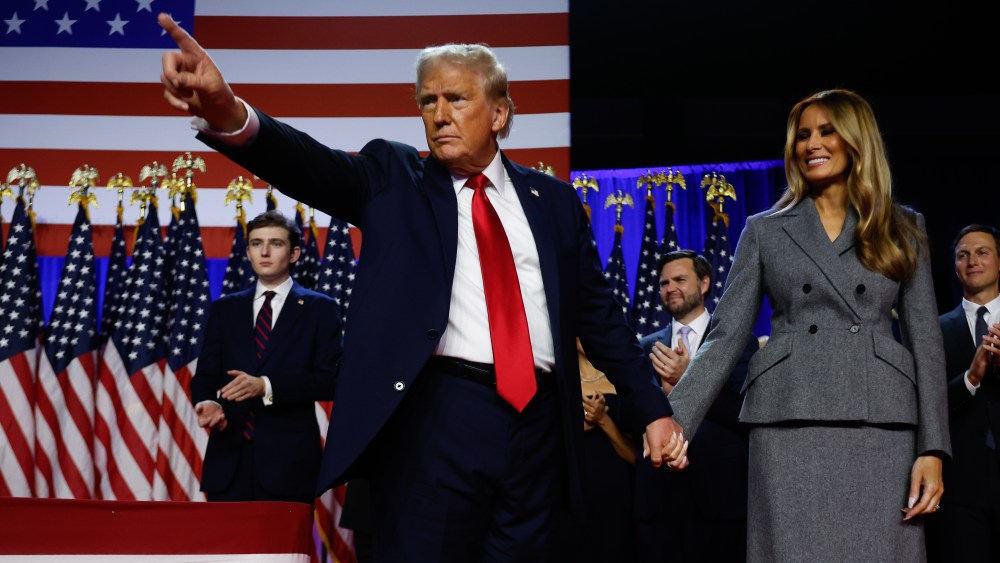At AFM, International Film Execs React to Trump’s Victory
While Tuesday may have been the biggest news day in several years for the U.S. (and, arguably, the world), over at the American Film Market in Las Vegas, guests would have been forgiven for not knowing a presidential election was actually taking place.
Despite Nevada being a battleground swing state, screens across the city’s casino halls and bars on Tuesday night were almost entirely showing sports — with bemused visitors struggling to find anywhere to watch the results come in. Indeed, AFM attendees could be spotted from the rest of the Vegas population by a mile: they were the only ones glued to their phones, looking puzzled as red started filling the U.S. map.
“I doubt any bars will be showing the election as we don’t want things to get political and heated — because politics is the surest way to start a fight,” noted one bartender. Within seconds she proved her point — the mere mention of the election sparked one drinker to start loudly shouting about her dislike of Kamala Harris.
It was the worry of a fight that actually kept many executives from the U.S. and overseas away from this year’s AFM, especially over concerns of a violent uprising should Harris have won. When Trump lost in 2020, his supporters attacked the U.S. Capital on Jan. 6, 2021.
This time, that wasn’t a concern: Trump won the election by a landslide.
“You can now say you were in Vegas when the biggest wild card brought U.S. democracy to a screeching halt,” said one AFM visitor, echoing a somber mood that was felt across the film market the next morning. (“What the fuck,” appeared to be a common utterance.)
One U.S. distributor said he watched the election with a bunch of international executives and he could feel the disappointment across the board.
“What was very obvious when we were all talking last night is that America has always sort of represented an ideal for so many different parts of the world, culturally, for so long,” he said. While Europe has been drifting towards far right in over a decade with Italy, Poland, France and more countries witnessing the rise of populist parties, the U.S. was perceived as a haven from the political tumults. That was until Trump’s first election win in 2016. His re-election has now completely ripped apart that image.
“People used to come to America to have a different sort of experience in the land of milk and honey, but it’s not anymore. The challenges that are facing the rest of the world are no different in America. It’s not a beacon on the hill any longer.”
Added another AFM attendee: “It’s a reality check. The fact that that the Republicans won the popular vote and the electoral college, it shows that this is the direction the country wants to go.”
But how could Trump’s second term impact popular culture?
According to one distribution exec, it might not affect the independent, specialized sector whose movies don’t necessarily appeal necessarily to Trump supporters. For studio movies, it’s a different story. “When they release on 4000 screens, they need the whole country to respond their movies.”
Despite Republicans winning the election and the Senate, there’s a sense that Hollywood and the rest of the predominantly left-leaning entertainment industry won’t give up on advocating for social justice and progressive ideals.
“Cultural change doesn’t just come from laws and regulations,” says an indie studio boss. “Media and entertainment are one of the most powerful forces in establishing the status quo and what we look to for societal norms. In a precarious time, where a bigoted hate-monger is in a position to make laws, media has a powerful responsibility to put forward messages of equality, representation, and acceptance.”
He added: “We must seek to how to normalize many of the social issues he used to divide us so this doesn’t happen again.”
At a time of massive consolidation in the film and TV sector, entertainment figures are also pondering the impact of Trump’s win on M&A activity.
“Trump being a Republican, he’s in favor of deregulation and he wants more open market activity so he could create potentially more business,” a U.S. buyer said.
With Republicans retaking control of the U.S. Senate, other entertainment-related hot-button issues at stake are AI regulations and copyright laws.
In France, President Emmanuel Macron told Variety recently about his efforts to establish a framework to regulate the responsibility of players who distribute AI and define the rules for knowing what’s true and what’s false. “It’s safe to predict that Republican lawmakers won’t go out of their way to pass legislation to protect creators, or fight against online hate speech and disinformation. Especially considering X boss Elon Musk’s influence on Trump’s victory,” said a French industry executive who has lived in the U.S. for the last two decades.
(Variety reporters did eventually manage to find somewhere to watch the election — an Irish bar where the only people interested were tourists, and Trump’s victory was soundtracked by a man singing Bob Marley covers.)


